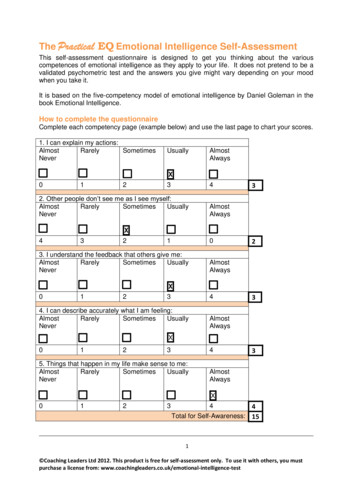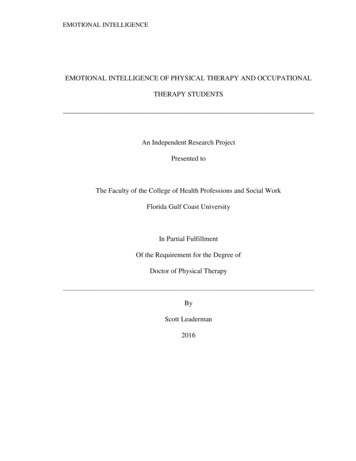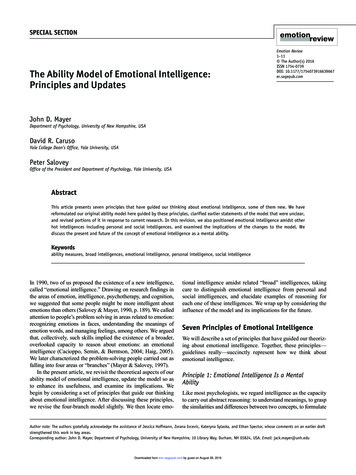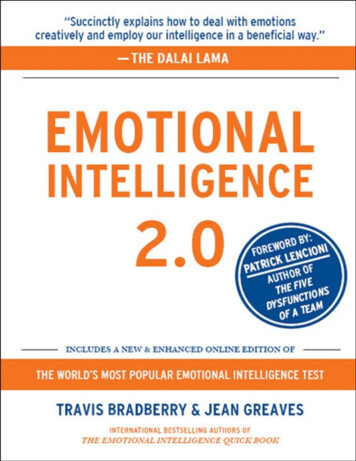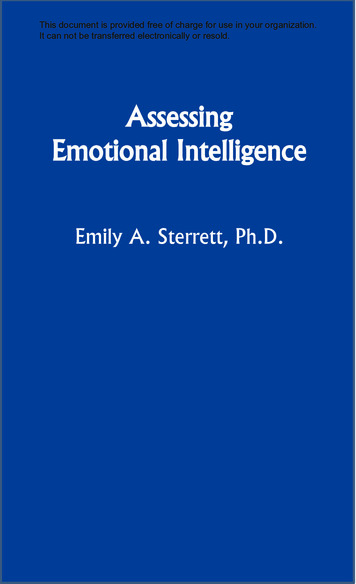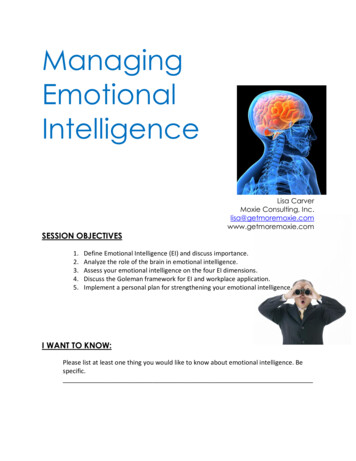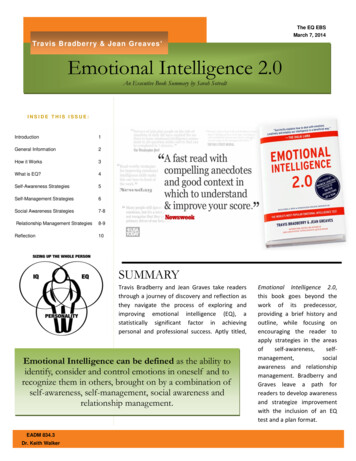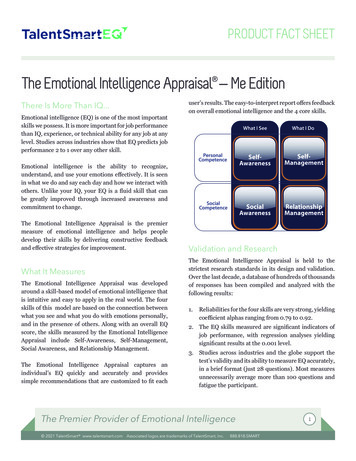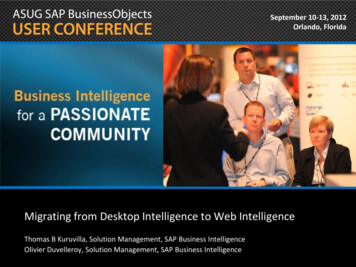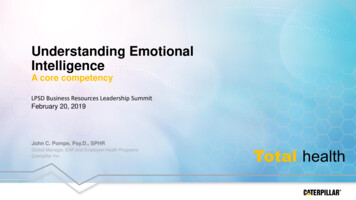
Transcription
Understanding EmotionalIntelligenceA core competencyLPSD Business Resources Leadership SummitFebruary 20, 2019John C. Pompe, Psy.D., SPHRGlobal Manager, EAP and Employee Health ProgramsCaterpillar Inc.
What is Emotional Intelligence? EQ in support of Caterpillar’s StrategyAgenda Why is it important in a business setting? Why is it important for leaders and consultants? Your EQ and how to improve itCaterpillar: Confidential GreenCaterpillar Confidential Green
Social Health Healthy and productive relationships Inclusion and connectedness High performing teams EQ can impact our workplace culture andclimate The end goal of EQ development ishealthier, more productive relationshipsCaterpillar: Confidential GreenCaterpillar Confidential Green
What Is (behavioral) Emotional Intelligence (EQ)?A set of skills that influence our ability to effectively: Perceive and interpret emotions and behavioral intent Express emotions appropriately Influence our interpersonal interactions Maintain positive relationships Positively impact our social environments EQ should NOT be all in your head. It is a means tochange behavior and build productive relationships.Caterpillar: Confidential GreenCaterpillar Confidential Green“ the capacity for recognizingour own feelings and those ofothers, for motivatingourselves, for managingemotions well in ourselves andin our relationships.- Daniel Goleman”
The Neurology ofEmotionalIntelligenceNeoCortex andFrontal LobeRational thinking,analytics, problemsolving. Slower and moredeliberate.Limbic Systemand AmygdalaSensoryinputCaterpillar: Confidential GreenCaterpillar Confidential GreenEmotion and arousalcenter. Fight or flightsystem. Fast andautomatic.
What does higherEQ allow us to do?NeoCortex andFrontal Lobe4.3.2.1.Rational thinking,analytics, problemsolving. Slower and moredeliberate.Analyze our/others’ emotions, makesense of them, and plan our action.Slow down and put space betweenour arousal and our actionQuickly detect our emotionalarousal, particularly in relation toothers.Awareness and detection ofemotionally arousing events. Theability to PREDICT our responseand that of others.Caterpillar: Confidential GreenCaterpillar Confidential GreenLimbic Systemand AmygdalaSensoryinputEmotion and arousalcenter. Fight or flightsystem. Fast andautomatic.
4 Characteristics of EQAwareness ofemotions andbehaviors ofourselves andothers.Caterpillar: Confidential GreenThe ability tointerpret themeaning andintent of bothemotions andbehaviorsCaterpillar Confidential GreenCoping withchallengingsituations,staying in control,influencinginteractionsAdjusting ourbehavior.Developingrelationshipsand maintainingthem in the longterm.
People withPeople withHigh Emotional IntelligenceLow Emotional Intelligence Are introspective Are externally focused Are humble Struggle to admit weakness Listen and think before they speak Talk and then wait to talk some more Offer suggestions Argue to win Get to know others Don’t take the time to get to know others Use emotions sparing and strategically Are impulsive and volatile Are transparent and create safety for others Transparency is a one way street with potholes Take responsibility for themselves and others Blame others Cope with stress and conflict Lose effectiveness during tense moments Draw people to them Repel others (sometimes subtly)Caterpillar: Confidential GreenCaterpillar Confidential Green
Our workplace challenge“A leader’s intelligence has to have a strong emotionalcomponent. S/he has to have high levels of selfawareness, maturity, and self control. She must be ableto withstand the heat, handle setbacks, and when thoselucky moments arise, enjoy success with equal parts ofjoy and humility. No doubt emotional intelligence (EQ) ismore rare than book smarts, but my experience says it isactually more important in the making of a leader. You justcan’t ignore it.”Caterpillar: Confidential GreenCaterpillar Confidential GreenJack Welch, Former CEO of General Electric
Why is EQ so important in the workplace?Research showsconvincingly that emotionalintelligence (EQ) is moreimportant than IQ in almostevery role, and many timesmore important in leadershiproles.- Dr. Steven CoveyCaterpillar: Confidential GreenCaterpillar Confidential GreenEQ positively impacts CommunicationRelationship qualityTeam engagement and retentionOrganizational effectiveness and stressAdaptability and ability to changeIndividual and team performance
Our Values in ActionIndividual BehaviorsLeader BehaviorsMaking Great LeadersEmployee InsightsDiversity & InclusionThe Caterpillar ExperienceCaterpillar: Confidential GreenCaterpillar Confidential Green
People- Who we engageEvery employee must help us achieve our goals We have a behavior model to help us focus on the critical behaviors needed for our strategyCaterpillar: Confidential GreenCaterpillar Confidential Green
Scoring your Brief EQ Self AssessmentCaterpillar: Confidential GreenCaterpillar Confidential Green
Scoring your Brief EQ Self Assessment What are your stronger areas andthose that may need some work? What do you think this means for you? Any surprises? Remember: No good/bad This isn’t about NOT experiencing emotions EQ has high levels of plasticity. It canchange if you try.Caterpillar: Confidential GreenCaterpillar Confidential Green
Four skills. Two Competencies.Caterpillar: Confidential GreenCaterpillar Confidential Green
Four skills. Two Competencies.Personal competence Self awareness and self managementskills More about YOU than others Being aware of your emotions, and Controlling your behaviorCaterpillar: Confidential GreenCaterpillar Confidential Green
Four skills. Two Competencies.Personal competence Self awareness and self managementskills More about YOU than others Being aware of your emotions, and Controlling your behaviorSocial competence Social awareness and relationshipmanagement skills Ability to understand mood, behavior andmotives. Show empathy. Adjust your behavior to achieve a goal.Caterpillar: Confidential GreenCaterpillar Confidential Green
Developing Your EQ SkillsetCaterpillar: Confidential GreenCaterpillar Confidential Green
Self AwarenessYour ability to accurately perceive your own emotions in themoment and understand your tendencies across situations. Self Awareness is a foundational skill. When youhave it, the EQ skills come easier. Highly correlated to job performance Requires a lot time to introspect and reflect Involves an understanding or your strengths,motivations and what triggers you.Caterpillar: Confidential GreenCaterpillar Confidential Green
Self Awareness Strategies1. Take time to reflect on how you feel about your experiences.Monitor yourself through mindfulness and journaling.2. Develop the language to articulate how you feel. Recognizehow emotions make you feel physically. Know yourselfunderstand stress.3. Don’t treat having or expressing feelings as good or bad.There are no good/bad emotions, only misplaced emotions.4. Know who/what pushes your buttons and WHY. Recognizethat controlling this is your responsibility. Don’t count on othersto fix how you feel.5. Ask for feedback. Validate your observations.Caterpillar: Confidential GreenCaterpillar Confidential Green
Self ManagementYour ability to use your awareness of your emotions to stayflexible and actively choose [control] what you say and do. Builds upon Self Awareness - you can’t manage youremotional response unless you recognize it. Recognizing then regulating emotions. Impulsecontrol- Putting space between the stimuli and yourreaction. Avoiding the Limbic System’s “emotional hijacking” It is a challenge to be passionate and driven, but stayin control of your emotional reactionsCaterpillar: Confidential GreenCaterpillar Confidential Green
Self Management Strategies1. Centering: deep breaths to slow your mind and body2. Take a time out. Count to 10 before responding. Never email or textangry. Sleep on it.3. Take care of your body- diet, exercise, relaxation and fun. Good sleephygiene4. Control your thinking and self-talk. Focus on what you can control. Keepexpectations reasonable and flexible.5. Learn from those role models who appeared measured and controlled.Get objective, feedback from others who are not emotionally invested inyou. EAP can help.Caterpillar: Confidential GreenCaterpillar Confidential Green
Social AwarenessYour ability to accurately pick up on emotions in other peopleand understand what is really going on with them. Listening and observing are key Empathy- express an understanding Requires setting aside your feelings and biases You aren’t listening and watching if you are thinkingof your own feelings or what you are going to say Must be in the moment Can involve group interactionCaterpillar: Confidential GreenCaterpillar Confidential Green
Social Awareness Strategies1. Listen and pay attention. Be present and in the moment.2. Practice and refine your empathy. Step into others’ shoes.Recognize cultural differences. If you are in doubt, ask.3. Plan ahead for social encounters. Learn names. Greet people bytheir names.4. Watch body language. Detect the mood of your audience andadjust.5. Recognize how your emotions and biases may be impactingothers.Caterpillar: Confidential GreenCaterpillar Confidential Green
Social SkillsYour ability to use your emotional awareness to shape yourencounters, influence and inspire others, put them at ease, andthrive in your relationships Essential for leadership: foundation of engagement,leadership and interpersonal effectiveness. Brings out the best in people. Helps problem solve and resolve conflicts. Builds bonds with individuals and teams to get thejob done. Poses the biggest challenge during times of stress.Caterpillar: Confidential GreenCaterpillar Confidential Green
Social Skills Strategies1. Be reasonably open and curious of others. Ask questions.2. Build trust through consistency and reliability. No mixed signals. Align theverbal and nonverbal. Control meta messages.3. Openly recognize others’ emotions. When you care, show it. Small gesturesgo a long way (including unwavering politeness). Demonstratecomplimentary emotions.4. Routinely ask for feedback. Take it well. Ask of your door needs to be moreopen.5. Only get mad on purpose.Caterpillar: Confidential GreenCaterpillar Confidential Green
SummaryEmotionally Intelligent People 1. Continually work to improve self awareness2. The are measured and controlled. They think before the speakand act.3. The are highly attuned to those around them, including groupsand workplace cultures.4. They put people at ease and quickly adjust their behavior.5. Have a fund of emotional experience, but they use it effectively.Caterpillar: Confidential GreenCaterpillar Confidential Green
Summary EQ can be improved with awareness and practice. Emotional awareness isn’t easy for most of us. Using EQ to improverelationships takes time. Emotional awareness alone isn’t enough. We have to translate it to behaviors. Even the best of us have lapses and fail to manage our behavior. Accurate, honest feedback is helpfulCaterpillar: Confidential GreenCaterpillar Confidential Green
Next Steps1. Pick ONE skill area where you want to focus.2. Review the suggested action steps in detail.3. Pick 3 specific action items and develop a writtenaction plan.4. Seek a mentor or trusted person to share yourplan and give you feedback.5. EAP can help as a resource for coaching,feedback and help making changes.6. Do some reading on EQ.7. Retest.Caterpillar: Confidential GreenCaterpillar Confidential Green
Next Steps SuggestedReadingCaterpillar: Confidential GreenCaterpillar Confidential Green
Thank you!John C. Pompe, Psy.D., SPHRpompejc@cat.comMaterials will be made available at EAP.cat.comCaterpillar: Confidential GreenCaterpillar Confidential Green
EQ can be improved with awareness and practice. Emotional awareness isn’t easy for most of us. Using EQ to improve relationships takes time. Emotional awareness alone isn’t enough. We have to translate it to behaviors. Even the best of us have lapses and fail to manage ou

